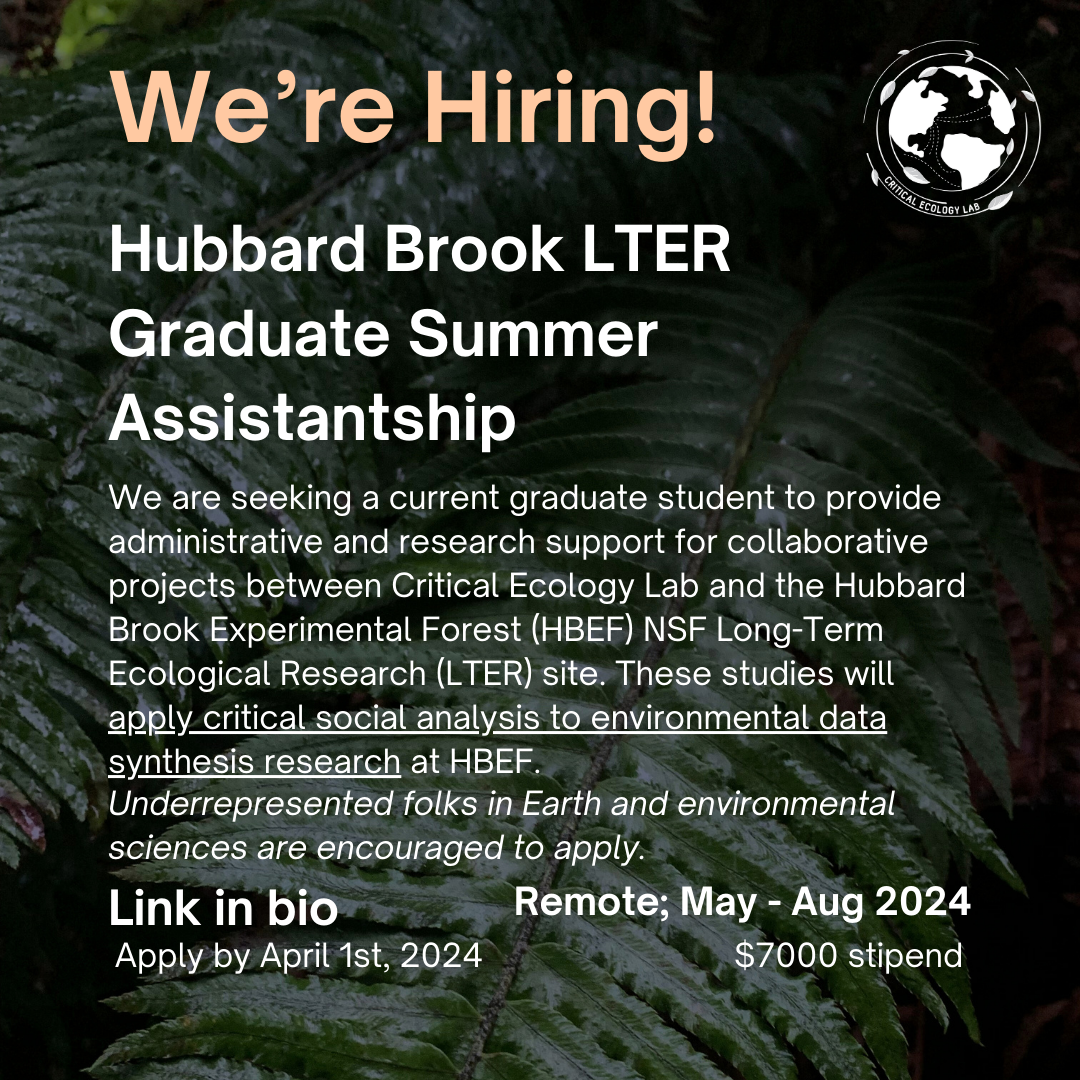Critical Ecology Lab is Hiring!
Critical Ecology Lab is a non-profit founded by Dr. Suzanne Pierre in 2020 to integrate the scientific and generational knowledge of oppressed communities to fight against social and planetary crises. They do this by facilitating informal education resources, creating novel scientific research, and activating communities towards climate action.
We invite applications for a summer assistant to support Hubbard Brook Experimental Forest (HBEF) NSF Long Term Ecological Research (LTER) scientists with research activities related to critical ecology, a new research focus area of the LTER site. Critical ecology research includes the quantitative analysis of social variables (e.g. social and economic equality) related to anthropogenic drivers of environmental change. In the context of the HBEF LTER, projects will focus on quantifying relationships between the social drivers of ecological disturbances and long-term environmental responses measured at the HBEF. The summer assistant will provide administrative and logistical support to investigators leading research concept meetings, data synthesis projects, and manuscripts for publication. The program assistant will also substantively participate in research activities under the supervision of Hubbard Brook scientists Dr. Suzanne Pierre, Dr. Pamela Templer, and Dr. Peter Groffman. The work will include literature review, data acquisition, and synthesis analyses of large social and ecological/biogeochemical datasets. The position will provide summer support for an enrolled graduate student in a degree program related to ecology, environmental studies, geography, ecological data science, or related fields. Experience with ecological data analysis and R is a plus.
The program assistant will commit 20 hours a week for four months (50% FTE; May-August) to the project and will receive $7000 in compensation for the work period. Successful applicants may be based anywhere in the United States and will work remotely with lead investigators. Travel may be required for in-person meetings.
We are especially eager to have people join our team who support an inclusive, equitable, and diverse community. Please submit a cover letter, curriculum vitae, and names and email addresses of three professional references via this form. Review of applications will begin April 1, 2024, and will continue until the position is filled. Inquiries about the position can be addressed to Dr. Suzanne Pierre at criticalecologylab@inquiringsystems.org with “Hubbard Brook Assistant 2024” included in the subject line.
The Hubbard Brook Ecosystem Study is a multidisciplinary community of scientists, students, technicians, educators, artists, and environmental leaders contributing to the long-term ecological research in the northern hardwood forest. The Study is a partnership among the USDA Forest Service, the National Science Foundation’s Long Term Ecological Research (LTER) and Long Term Research in Environmental Biology (LTREB) programs, the Hubbard Brook Research Foundation, and scientists from research institutions throughout the world.
Hubbard Brook Research Foundation
Established in 1993, the Hubbard Brook Research Foundation (HBRF) delivers cutting-edge science to decision-makers on the front lines of environmental change. They bridge gaps between science and education, public policy, land management, corporate sustainability, and recreation. Their programs include roundtable and town-hall events, policy-relevant briefings and bulletins, social and mainstream media outreach, and communication training for students and early-career researchers.
Hubbard Brook Experimental Forest
The Hubbard Brook Experimental Forest is located on unceded Abenaki land in the southwestern part of the White Mountain National Forest in New Hampshire. This 3,037-hectare (~8,700-acre) forest takes the shape of a bowl-oriented valley, running east to west. Its watersheds are both north- and south-facing slopes, nine of which are equipped with stream gaging stations and other instruments, enabling scientists to delve into the movement of water and chemicals through the ecosystem. It is managed by the USDA Forest Service.

